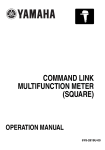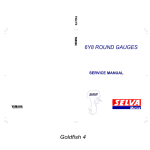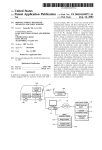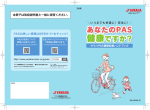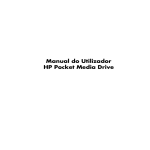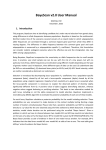Download Yamaha Operations Owner`s manual
Transcript
COMMAND LINK MULTIFUNCTION METER (ROUND) OPERATION MANUAL 6Y8-2819V-00 To the owner Thank you for choosing the Yamaha Command Link Multifunction Meter. This Operation Manual contains information you will need for proper operation. A thorough understanding of these simple instructions and of those in the Owner’s Manual of the outboard motor will help you obtain maximum enjoyment of your new Yamaha. This manual should be considered a permanent part of this meter and should remain with it even if the meter is subsequently sold. In this Operation Manual particularly important information is distinguished in the following ways. The Safety Alert Symbol means ATTENTION! BECOME ALERT! YOUR SAFETY IS INVOLVED! WARNING Failure to follow WARNING instructions could result in severe injury or death to the machine operator, a bystander, or a person inspecting or repairing the outboard motor. CAUTION: A CAUTION indicates special precautions that must be taken to avoid damage to the outboard motor. NOTE: A NOTE provides key information to make procedures easier or clearer. COMMAND LINK MULTIFUNCTION METER (ROUND) OPERATION MANUAL ©2005 by Yamaha Motor Co., Ltd. 1st Edition, March 2005 All rights reserved. Any reprinting or unauthorized use without the written permission of Yamaha Motor Co., Ltd. is expressly prohibited. Printed in Japan The Command Link Multifunction Meter enables the display of information through digital communication with the engine. The operations of the set button and the mode button are described in this manual as follows. Optional parts such as the speed sensor, cooling water pressure sensor, TriducerMulti sensor, and GPS are described in this manual by assuming that the parts are installed and set up on the outboard motor. Button operations: The Command Link Multifunction Meter described in this manual consists of the following. • Tachometer unit (Part No.: 6Y8-8350T-1*) • Speed & Fuel meter unit (Part No.: 6Y8-83500-1*) The Command Link Multifunction Meter is compatible with the following outboard motors. 4-stroke models: Fuel injection models only 2-stroke models: HPDI models only • Press the set button one time. • Press the mode button one time. • or Press the set button or the mode button one time. • (1 second) Press the set button for 1 second. • (4 seconds) Press the mode button for 4 seconds. • (10 seconds) Press the set button for 10 seconds. • (1 second) (2 times) Press the mode button two times, 1 second each time. • + Press the set button and the mode button simultaneously. • + (1 second) Press the set button and the mode button simultaneously for 1 second. 2. Speed & Fuel meter unit ........ Description ................................ Activating the meter .................. Speedometer............................. Fuel meter ................................. Multifunction display .................. 16 17 17 18 19 19 Fuel flow display .................... Fuel economy display ............ Total fuel consumption display................................. Ambient water temperature display (optional: Triducer-multi sensor has been installed) .................... Depth display (optional: Triducer-multi sensor has been installed) .................... Clock (optional: GPS has been installed) .................... Trip display (optional: speed sensor has been installed) ............................. Changing backlight settings ...... Changing settings (custom mode) ....................... Switching to custom mode ..... 01 (setting displayed units) .... 02 (setting fuel sensor) .......... 03 (setting correction value) .. 20 21 3. Setting up the meters ............ Activating for the first time......... Setting the initial settings .......... Tachometer unit ..................... Speed & Fuel meter unit: ....... 28 28 28 28 28 21 22 23 23 23 24 24 24 26 26 Speed & Fuel meter unit 22 Setting up the meters 1. Tachometer unit ....................... 1 Description .................................. 2 Activating the meter .................... 2 Periodic maintenance notification ............................. 3 Tachometer ................................. 3 Trim meter................................... 3 Multifunction display .................... 4 Cooling water/engine temperature display............... 5 Battery voltage display ............. 6 Total hour/Trip hour display ..... 7 Cooling water pressure display (optional: cooling water pressure sensor has been installed)................................ 7 Oil pressure display (4-stroke models) .................. 8 Oil level display (2-stroke models) .................. 9 Water detection warning .......... 9 Changing backlight settings ...... 10 Adjusting trolling speed ............. 10 Changing settings (custom mode) ....................... 11 Switching to custom mode ..... 11 01 (resetting maintenance intervals).............................. 12 02 (setting trim angle) ............ 12 03 (setting corresponding engine) ................................ 13 Service functions ....................... 14 Diagnosis ............................... 14 Resetting engine number ....... 15 Tachometer unit Table of contents 1. Tachometer unit NOTE: Depending on the model of the outboard motor, some functions may not be compatible. For information on models which contain the compatible functions, consult a Yamaha dealer. Tachometer The tachometer shows the engine revolutions per minute. (Page 3) Trim meter The trim meter shows the trim angle of the outboard motor in 13 levels. (Page 3) Adjusting trolling speed or : To adjust the trolling speed randomly. (Page 10) Multifunction display (Page 4) · You can switch each engine information and show it using numeric values or graphics. In addition, when an engine malfunction occurs, each indicator blinks to warn of the malfunction. Cooling water/engine temperature display (Page 5) Battery voltage display (Page 6) Total hour/Trip hour display (Page 7) Cooling water pressure display (optional) (Page 7) Oil pressure display (4-stroke models) (Page 8) Oil level display (2-stroke models) (Page 9) Water detection warning (Page 9) · Periodic maintenance intervals are notified. Periodic maintenance notification (Page 3) 1 Description/Activating the meter Activating the meter When the engine start switch is turned to ON, the meter is activated and “ ” appears on the multifunction meter. Then, all the displays come on and the display switches to the normal display after the total hour display comes on. 1 2 1 set button 2 mode button 1 45 2 3 6 7 8 9 0 1 2 3 4 5 6 7 8 9 0 Tachometer Trim meter Multifunction display Water detection warning indicator Maintenance indicator Cooling water pressure Oil pressure (4-stroke models) Oil level (2-stroke models) Cooling water/engine temperature Battery voltage 2 Tachometer unit Description Tachometer/Trim meter Tachometer Periodic maintenance notification When the hours of engine operation exceed 100 hours, the elapsed time from the previous maintenance period (when the meter was reset) blinks. or The tachometer shows the engine revolutions per minute. : To return to the normal dis- play. Trim meter The trim meter shows the trim angle of the outboard motor in 13 levels. Blinks NOTE: • The elapsed time blinks every time the engine is started until it is reset. In addition, the maintenance indicator ( ) remains on until it is reset. • When the hours of engine operation exceed 100 hours and the periodic maintenance notification is activated, consult an authorized Yamaha dealer for periodical maintenance. • To reset the maintenance period, see “01 (resetting maintenance intervals)” in “Changing settings (custom mode).” When the angle of the outboard motor exceeds the trim range, the top segment blinks. Blinks 3 Multifunction display When the engine start switch is turned to OFF, the last display shown is shown first when the engine start switch is turned to ON again. The multifunction display shows various information using numeric values or graphics. : Press to switch between the displays. NOTE: If an optional sensor is not connected to the meter, the corresponding display will not be displayed. Cooling water/ engine temperature Battery voltage level/ Battery voltage value Total hour/Trip hour Cooling water pressure Oil pressure (4-stroke) Oil level (2-stroke) 4 Tachometer unit Multifunction display Cooling water/engine temperature display Cooling water/engine temperature display The cooling water/engine temperature indi- NOTE: The cooling water/engine temperature display shows “L” for low and “H” for high. cator ( ) comes on and the cooling water temperature or the engine temperature is shown in 6 levels. When the engine overheats, the cooling water/engine temperature indicator ( blinks to warn of the malfunction. ) Blinks CAUTION: • When the overheat warning comes on, turn the engine off and check the cooling water inlet for clogs. • If you cannot locate and correct the cause, consult a Yamaha dealer. 5 Battery voltage display Tachometer unit Battery voltage display The battery voltage indicator ( ) comes on and the battery voltage of the engine is shown in 6 levels or the voltage value is shown. : Press to switch between the display formats. Battery voltage level Blinks When the battery voltage decreases below the voltage that is required by the engine, Battery voltage value the battery voltage indicator ( to warn of the malfunction. ) blinks Blink CAUTION: • When the low battery voltage warning comes on, check the battery and the wiring. • If you cannot locate and correct the cause, consult a Yamaha dealer. When the battery voltage decreases to 12 volts or less or increases to 16 volts or more the voltage value blinks. NOTE: The battery voltage level display shows “L” for low and “H” for high. 6 Total hour/Trip hour display/Cooling water pressure display Total hour/Trip hour display The total hour display shows the total hours of engine operation and the trip hour display shows the trip hours (T). Cooling water pressure display (optional: cooling water pressure sensor has been installed) The cooling water pressure indicator ( ) comes on and the cooling water pressure is shown in 6 levels. : Press to switch between the display formats. Total hour Trip hour (T) Blinks 10 psi CAUTION: Blinks • When the cooling water pressure decreases to 10 psi or less, turn the engine off and check the cooling water inlet for clogs. • If you cannot locate and correct the cause, consult a Yamaha dealer. NOTE: The cooling water pressure level display shows “L” for low and “H” for high. Blinks + hours (T). (1 second): To reset the trip NOTE: The total hours of engine operation cannot be reset. 7 Oil pressure display (4-stroke models) NOTE: • The oil pressure display shows “L” for low and “H” for high. • The low oil pressure warning does not display the engine oil level. • Depending on the model of the outboard motor, the oil pressure display may not be available. • Depending on the operating conditions such as when the engine is operated at extremely low speeds, the oil pressure may be shown as low even when the engine is operating properly. The oil pressure indicator ( ) comes on and the engine oil pressure is shown in 6 levels. When the engine oil pressure drops too low, the oil pressure indicator ( warn of the malfunction. ) blinks to Blinks CAUTION: • Do not operate the engine without engine oil. Severe engine damage can result. • Check the oil level by following the procedure described in the engine Owner’s Manual. • If you cannot locate and correct the cause, consult a Yamaha dealer. 8 Tachometer unit Oil pressure display (4-stroke models) Oil level display (2-stroke models)/Water detection warning Oil level display (2-stroke models) The oil level indicator ( ) comes on and the engine oil level is shown in 3 levels. Water detection warning When water has accumulated in the water separator (fuel filter), the water detection warning indicator ( ) blinks to warn of the malfunction. This function is not available for outboard motors that are not equipped with the water detection warning function. Blinks When the engine oil level is low, the oil level indicator ( function. ) blink to warn of the mal- CAUTION: CAUTION: When the water detection warning comes on, turn the engine off and remove the water from the water separator (fuel filter) by following the procedure described in the Owner’s Manual of the outboard motor. A malfunction can result if fuel mixed with water is sent to the engine. Do not operate the engine without engine oil. Severe engine damage can result. NOTE: Blink or 9 : To deactivate the buzzer. Changing backlight settings Adjusting trolling speed You can turn the backlight on or off, or change the brightness level of the backlight for all meters synchronized. You can adjust the trolling speed randomly by increasing or decreasing it approximately 50 r/min. When in the trolling speed setting mode, the display switches to the normal display when the engine speed is increased (within 3,000 r/min) using the throttle. When the throttle is closed, the display returns to the trolling speed setting mode. This function is not available for outboard motors that are not equipped with the trolling speed adjustment function. 1. + mode. : To activate the backlight 2. : Press to switch between the five brightness levels (1–5). : To switch between the backlight on and “OFF.” 1. 3. + display. (1 second): To activate the trolling speed setting mode. : To return to the normal NOTE: • The backlight default settings are “OFF” and brightness level 1. • If no operations are carried out for 5 seconds or more, the display returns to the normal display. • The backlight settings can be changed from all meters and all displays. 2. : To decrease the engine speed. 3. : To increase the engine speed. 4. 10 : To return to the normal display and to the default engine idle speed. Tachometer unit Changing backlight settings/Adjusting trolling speed Changing settings (custom mode) Changing settings (custom mode) NOTE: Switching to custom mode In the custom mode, you can change the meter function settings. Each setting function number is shown in the tachometer display. 1. Turn the engine off and the engine start switch to ON. • Trolling is affected by currents and other operating conditions and may differ from the actual engine speed. • The default engine idle speed is reset automatically when the display is switched to the normal display. The default engine idle speed is also reset automatically when the engine is turned off or when the engine speed exceeds 3,000 r/min. • When warming up a cold engine, the trolling speed cannot be decreased below the specified engine idle speed. • Depending on the model of the outboard motor, some functions may not be compatible. For information on models which contain the compatible functions, consult a Yamaha dealer. 2. (4 seconds): To activate the custom mode. 3. (1 second): Press to switch between the setting function numbers and to switch to the change settings display. 01 (resetting maintenance intervals) (1sec.) 02 (setting trim angle) (1sec.) (1sec.) 03 (setting corresponding engine) 4. Change each setting and return to the normal display. To change the settings, see the corresponding sections for each setting function. NOTE: If no operations are carried out for 30 seconds or more or if the engine is started, the settings will not be applied and the display returns to the normal display. 11 02 (setting trim angle) You can set the trim angle to zero. Fully trim the outboard motor down. 1. Turn the engine off and the engine start switch to ON. 01 (resetting maintenance intervals) You can reset the elapsed time from the previous maintenance interval (when the meter was reset). 1. Turn the engine off and the engine start switch to ON. 2. (4 seconds): To activate the custom mode and to switch to the resetting display. 2. (4 seconds): To activate the custom mode. 3. (1 second): To switch between the setting function numbers and to switch to the zero adjustment display. 4. + (1 second): To adjust the trim angle to zero using the current trim position as the standard value and return to the normal display. Blinks 3. + (1 second): To reset the elapsed time to “0h” and return to the normal display. NOTE: Press the button for 1 second from step 2 to cancel the resetting of the elapsed time and return to the normal display. NOTE: • When one segment is displayed, the trim angle of the outboard motor is adjusted to zero (full trim in). • Press the button for 1 second from step 3 to cancel the adjustment of the trim angle to zero and return to the normal display. 12 Tachometer unit 01 (resetting maintenance intervals)/02 (setting trim angle) 03 (setting corresponding engine) 03 (setting corresponding engine) You can select the engines that are compatible to this meter. The port outboard motor is set to “-1- (engine number 1)” and the starboard outboard motor is set to “-2- (engine number 2).” 1. Turn the engine off and the engine start switch to ON. 2. (4 seconds): To activate the custom mode. 3. (1 second) (2 times): Press to switch between the setting function numbers and to switch to the change settings display. 4. : To switch between the displayed engine numbers. NOTE: • The meters are set at the factory to “-1- (engine number 1).” • To reset an engine number, see “Resetting engine number” in “Service functions.” -1- (engine number 1) -2- (engine number 2) -3- (engine number 3) -4- (engine number 4) 5. (1 second): To change the corresponding engine and return to the normal display. 13 Service functions CAUTION: Diagnosis You can display the self-diagnosis results of the engine. When a diagnosis code other than “-01-” is displayed, the engine cannot be operated normally. Consult a Yamaha dealer. (10 seconds): To display the diagnosis codes. When there are no malfunctions, the “-01-” diagnosis code is displayed. NOTE: Although the custom mode is activated after a few seconds while the button is being pressed, continue to press the button for 10 consecutive seconds to activate the diagnosis mode. When a malfunction occurs, the corresponding diagnosis codes, except “-01-,” are displayed. When there are multiple diagnosis codes, press the code number. button to display the next (1 second): To return to the normal display. 14 Tachometer unit Service functions Service functions Resetting engine number When replacing the engines of multiple outboard motors or resetting the setting order, reset all engine numbers to “-1- (engine number 1).” 1. Turn the engine off and the engine start switch to ON. 2. (10 seconds): “-00-” will be displayed for 1 second. 3. Turn the engine start switch to OFF. The engine number is reset after approximately 10 seconds. Turn the engine start switches to ON in order from port to starboard. 4. NOTE: • The engine numbers are stored in the ECM (Engine Control Module) of each engine for engine identification. • The engine numbers are stored in the ECM (Engine Control Module) when the engine start switch is first turned to ON after being connected. The numbers are stored in order from number one to number four starting from the port outboard motor. When multiple outboard motors are installed, be sure to wait at least 2 seconds before turning each engine start switch to ON. 15 2. Speed & Fuel meter unit NOTE: Speedometer Shows the speed of the boat. You can switch the displayed unit to miles per hour (mph), knots, or kilometers per hour (km/h). (Page 18) Fuel meter The fuel meter shows the remaining fuel level in 8 levels. (Page 19) Multifunction display (Page 19) · You can switch each engine information and show it using numeric values. Fuel flow display (Page 20) Fuel economy display (Page 21) Total fuel consumption display (Page 21) Ambient water temperature display (optional) (Page 22) Depth display (optional) (Page 22) Clock (optional) (Page 23) Trip display (optional) (Page 23) 16 Speed & Fuel meter unit Depending on the model of the outboard motor, some functions may not be compatible. For information on models which contain the compatible functions, consult a Yamaha dealer. Description/Activating the meter Description Activating the meter When the engine start switch is turned to ON, the meter is activated and “ ” appears on the multifunction meter. Then, all the displays come on and the display switches to the normal display after a few seconds. 1 2 1 set button 2 mode button 1 2 3 1 Speedometer 2 Fuel meter 3 Multifunction display 17 Speedometer The speedometer shows the ground speed or the water speed of the boat. To display the ground speed, the GPS must be connected to the meter. To display the water speed, an optional sensor (speed sensor or Triducer-Multi sensor) must be connected to the meter. NOTE: • If no operations are carried out for 30 seconds or more, the display returns to the normal display. • When signals from the GPS cannot be received even when the GPS function is on, the GPS display goes off and the water speed is displayed. • You can select to show miles per hour (mph), kilometers per hour (km/h), or knots on the speedometer display. To change the displayed unit, see “01 (setting displayed units)” in “Changing settings (custom mode).” Switching the speed sensors: 1. (4 seconds): To activate the speed sensor setting mode. 2. : Press to switch between the speed sensor types. “On” (ground speed) “OFF” (water speed) 3. (1 second): To set the speed sensor and return to the normal display. 18 Speed & Fuel meter unit Speedometer Fuel meter/Multifunction display Fuel meter FLOW The fuel meter shows the remaining fuel level in 8 levels and all the segments are displayed when the fuel tank is full. When the fuel level is low, the last segment blinks. ECON TTL NOTE: The fuel sensor setting can be changed according to the fuel sensor type. To change the fuel sensor setting, see “02 (setting fuel sensor)” in “Changing settings (custom mode).” TEMP Multifunction display The multifunction display shows various information using numeric values. DPTH : Press to switch between the displays. Clock TRIP 19 Fuel flow display When the engine start switch is turned to OFF, the last display shown is shown first when the engine start switch is turned to ON again. Fuel flow display FLOW shows the total fuel consumption per hour of all engines. • To change the various settings, see “Changing settings (custom mode).” • If an optional sensor is not connected to the meter, the corresponding display will not be displayed. NOTE: You can select to show gallons per hour (gph) or liters per hour (l/h) on the FLOW display. To change the displayed unit, see “01 (setting displayed units)” in “Changing settings (custom mode).” 20 Speed & Fuel meter unit NOTE: Fuel economy display/Total fuel consumption display Total fuel consumption display TTL shows the total fuel consumption of all engines. Fuel economy display ECON shows the distance traveled per unit of fuel. The TTL display cannot measure over 1,999 gallons or 1,999 liters. When there are more than 1,999 gallons or 1,999 liters of fuel, the numeric value blinks to indicate an overflow. NOTE: • Fuel economy is affected by the type of boat being operated and the operating conditions, and it is constantly changing. • You can select to show miles per gallon (mpg), nautical miles per liter (nm/l), or kilometers per liter (km/l) on the ECON display. To change the displayed unit, see “01 (setting displayed units)” in “Changing settings (custom mode).” Blinks + display. (1 second): To reset the TTL NOTE: You can select to show gallons (g) or liters (l) on the TTL display. To change the displayed unit, see “01 (setting displayed units)” in “Changing settings (custom mode).” 21 Ambient water temperature display/Depth display Depth display (optional: Triducer-multi sensor has been installed) DPTH shows the water depth. NOTE: You can select to show feet (F) or meters (m) on the DPTH display. To change the displayed unit, see “01 (setting displayed units)” in “Changing settings (custom mode).” NOTE: You can select to show Fahrenheit (°F) or Celsius (°C) on the TEMP display. To change the displayed unit, see “01 (setting displayed units)” in “Changing settings (custom mode).” 22 Speed & Fuel meter unit Ambient water temperature display (optional: Triducer-multi sensor has been installed) TEMP shows the ambient water temperature. Clock/Trip display/Changing backlight settings Trip display (optional: speed sensor has been installed) TRIP shows the information from the speed sensor converted to the distance traveled. Clock (optional: GPS has been installed) The clock shows the time in 12 hours. The local time is easily displayed by calculating the longitude information received from the GPS communication data. Set the time as necessary. Setting the time: 1. : To activate the time setting mode and switch to the time setting display. + (1 second): To reset the distance traveled. NOTE: 4. : To change the hours. Press and hold to advance quickly. • The distance traveled is affected by currents and other operating conditions and may differ from the actual distance traveled. • You can select to show miles (mile), nautical miles (nm), or kilometers (km) on the TRIP display. To change the displayed unit, see “01 (setting displayed units)” in “Changing settings (custom mode).” 5. : To set the time and return to the normal display. Changing backlight settings Blinks 2. 3. : To change the minutes. Press and hold to advance quickly. : To set the hours. You can turn the backlight on or off, or change the brightness level of the backlight for all meters collectively. Resetting the time: 1. : To activate the time setting mode and to switch to the time setting display. 2. + (1 second): To reset the time to “0:00” and return to the normal display. NOTE: The backlight setting procedure is the same as that of the tachometer unit. To change the backlight settings, see “Changing backlight settings” in “1. Tachometer unit.” 23 Changing settings (custom mode)/01 (setting displayed units) Changing settings (custom mode) 2. (4 seconds): To activate the custom mode. 2. (4 seconds): To activate the custom mode and to switch to the change settings display. 3. : Press to switch between the displays. Speedometer TRIP (trip) FLOW (fuel flow) ECON (fuel economy) 3. (1 second): Press to switch between the setting function numbers and to switch to the change settings display. TTL (total fuel consumption) TEMP (ambient water temperature) 01 (setting displayed units) (1sec.) 02 (setting fuel sensor) (1sec.) 03 (setting correction value) 4. DPTH (depth) (1sec.) Change each setting and return to the normal display. To change the settings, see the corresponding sections for each setting function. NOTE: Blinks If no operations are carried out for 30 seconds or more or if the engine is started, the settings will not be applied and the display returns to the normal display. * In the display example, the speedometer is shown. 24 Speed & Fuel meter unit 01 (setting displayed units) You can change the units that are shown in each display. The indicator of the selected display blinks. 1. Turn the engine off and the engine start switch to ON. Switching to custom mode In the custom mode, you can change the meter function settings. Each setting function number is displayed in the speedometer display. 1. Turn the engine off and the engine start switch to ON. 01 (setting displayed units) 4. : Press to switch between the displays. In addition, you can select to not show the display. Speedometer You can select to show miles per hour (mph), kilometers per hour (km/h), or knots. The default setting is miles per hour (mph). TRIP You can select to show miles (mile), nautical miles (nm), kilometers (km), or not to show the display. The default setting is miles (mile). FLOW You can select to show gallons per hour (gph), liters per hour (l/h), or not to show the display. The default setting is gallons per hour (gph). ECON You can select to show miles per gallon (mpg), nautical miles per liter (nm/l), kilometers per liter (km/l) or not to show the display. The default setting is miles per gallon (mpg). TTL You can select to show gallons (g), liters (l), or not to show the display. The default setting is gallons (g). TEMP You can select to show Fahrenheit (°F), Celsius (°C), or not to show the display. The default setting is Fahrenheit (°F). DPTH You can select to show feet (F), meters (m), or not to show the display. The default setting is feet (F). 5. NOTE: (1 second): To change the displayed unit and return to the normal display. 25 • When the speedometer unit settings are changed, the TRIP, FLOW, ECON, TTL, TEMP, and DPTH unit settings are collectively changed automatically. To change the settings for each displayed unit individually, repeat steps 3 and 4. • Press the and buttons simultaneously for 1 second from step 2 to reset all displayed units to the default settings. 02 (setting fuel sensor) You can set the fuel sensor type that is connected to this meter. 1. Turn the engine off and the engine start switch to ON. 03 (setting correction value) You can calibrate the displayed fuel flow value within –7 to +7 percent. The difference in the fuel consumption display and the actual fuel consumption is calibrated. 2. (4 seconds): To activate the custom mode. 3. (1 second): To switch between the setting function numbers and to switch to the change settings display. 4. : Press to switch between the fuel sensor types. Checking the calibration value: 1. Operate the outboard motor on a full tank of fuel. 2. After operating the outboard motor, fill the fuel tank. Compare the amount of fuel filled into the fuel tank with the fuel consumed shown on the fuel consumption display and set the calibration value to the difference if necessary. -1- (ABYC-US) Changing the calibration value: 1. Turn the engine off and the engine start switch to ON. -2- (EUROPE) -3- (YAMAHA) 2. (4 seconds): To activate the custom mode. 3. (1 second) (2 times): Press to switch between the setting function numbers and to switch to the change settings display. 4. : Press to switch between the calibration values. 5. (1 second): To change the calibration value and return to the normal display. Blinks 5. (1 second): To change the fuel sensor type and return to the normal display. 26 Speed & Fuel meter unit 02 (setting fuel sensor)/03 (setting correction value) 03 (setting correction value) NOTE: • The fuel flow display may differ depending on the operating conditions. • When the fuel flow calibration value is changed, the FLOW, TTL, and ECON displays are shown calibrated. 27 Activating for the first time/Setting the initial settings 3. Setting up the meters Activating for the first time To install the meters and the optional sensors and to connect the meters to the engine, see the “Command Link Multifunction Meter Installation Manual.” Be sure to follow the procedures in “Activating for the first time” and “Setting the initial settings.” If the procedures are performed incorrectly, the engine number will change, resulting in improper operation. 1. Installing the meters 2. Connecting the meters to the engine 3. Installing an optional sensor 4. Activating for the first time 5. Setting the initial settings After installing the meters, be sure to turn the engine start switch to ON when the power is supplied for the first time. When multiple outboard motors are installed, be sure to turn the engine start switch to ON from the port outboard motor and to wait at least 2 seconds before turning each engine start switch to ON. • The engine number of the engine whose engine start switch was first turned to ON is stored in the ECM (Engine Control Module) of the engine as the port engine (engine number 1). • To reset an engine number, see “Resetting engine number” under “Service functions” in “1. Tachometer unit.” If the procedures are performed incorrectly, see “Service functions” in “1. Tachometer unit” to reset all of the engine numbers. Check the connections, and follow the setup procedures again to set up the meters. Setting the initial settings Before operating the meter, be sure to change the default settings as described below. For the setting procedures, see the corresponding setting procedure for each meter. Tachometer unit 03 (setting corresponding engine) Select the engines compatible to this meter. (See page 13.) 02 (setting trim angle) Adjust the trim angle to zero. (See page 12.) Speed & Fuel meter unit 02 (setting fuel sensor) Set the fuel sensor according to the fuel tank type. (See page 26.) 28 Setting up the meters NOTE: YAMAHA MOTOR CO., LTD. Printed in Japan March 2005 – 1.0 × 1 CR (E) Printed on recycled paper




































